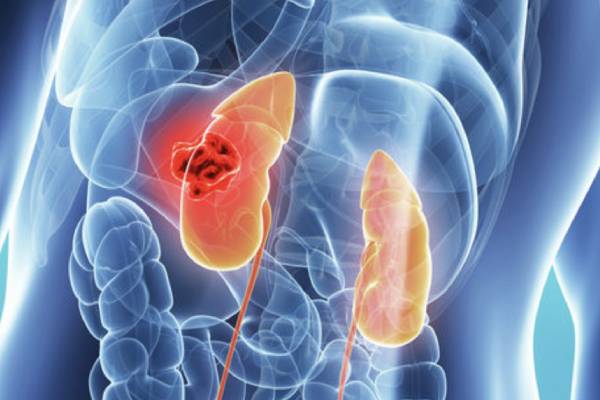Are you looking for an expert in kidney cancer care? Dr. M.S.S. Keerthi, a renowned Best surgical oncologist in Hyderabad, has over 15 years of experience in performing advanced cancer surgeries. Specializing in kidney cancer, as well as esophageal, lung, stomach, and oral cancers, Dr. M.S.S. Keerthi offers a combination of expertise, compassion, and the latest surgical techniques. If you or your loved one is facing kidney cancer, don’t wait. Early detection and expert care are critical for better outcomes.

What is Kidney Cancer
Kidney cancer, also known as renal cell carcinoma, typically starts in the small tubes of the kidney. Early detection and treatment can lead to favorable outcomes. Your kidneys are two bean-shaped organs, each about the size of your fist. They’re located behind your abdominal organs, with one kidney on each side of your spine.
In adults, renal cell carcinoma is the most common type of kidney cancer. Other less common types of kidney cancer can occur. Young children are more likely to develop a kind of kidney cancer called Wilms’ tumor.
5 Symptoms of Kidney Cancer
Kidney cancer can be asymptomatic in its early stages. However, as the tumor grows, it can lead to various symptoms, including:
- Blood in Urine (Hematuria): One of the most common signs of kidney cancer is blood in the urine, which may appear pink, red, or brown.
- Lump in the Abdomen: Some patients may feel a palpable mass or lump in the side or abdomen where the affected kidney is located.
- Pain: Persistent pain in the side or lower back, below the ribs, can be an indication of kidney cancer.
- Fatigue: Unexplained fatigue and weight loss can occur as the cancer progresses.
- Fever and Night Sweats: Some people may experience fever and night sweats, although this is less common.
Diagnosis Options for Kidney Cancer
- Imaging (CT, MRI, Ultrasound): Imaging plays a crucial role in the diagnosis of kidney cancer. These techniques help visualize the kidney and any potential tumors. Computed Tomography (CT) scans provide detailed cross-sectional images of the kidney and surrounding structures. Magnetic Resonance Imaging (MRI) offers high-resolution images and is useful in cases where CT scans are inconclusive. Ultrasound is another non-invasive method to visualize the kidney and is often used as a preliminary diagnostic tool.
- Biopsy (Rarely Done): Kidney cancer is often diagnosed based on imaging results, and biopsies are rarely required. However, in some cases where imaging results are inconclusive or there is a need to confirm the diagnosis, a biopsy may be performed. During a biopsy, a small sample of kidney tissue is obtained and examined under a microscope to determine the presence of cancerous cells.
- Staging: Staging is essential to determine the extent of the disease and guide treatment decisions. The TNM system (Tumor, Node, Metastasis) is commonly used for kidney cancer. It considers factors such as tumor size, lymph node involvement, and the presence of distant metastasis. Staging helps oncologists assess the prognosis and plan appropriate treatment.
Supportive Care:
- Pain Management: Managing pain is crucial in kidney cancer treatment. Patients may experience pain from the tumor itself or as a result of surgery or other treatments. Pain can be controlled with medications, nerve blocks, or other interventions, and the goal is to improve the patient’s quality of life.
- Blood Pressure Control: Kidney cancer can affect blood pressure, and some treatments, such as TKIs, may also impact blood pressure. Maintaining healthy blood pressure levels is important for overall well-being and to minimize potential side effects.
- Nutrition: A balanced diet is essential for kidney cancer patients, as it can help maintain strength and manage potential side effects of treatment. Nutritionists can provide guidance on dietary choices to support the patient’s overall health and well-being during treatment.
Why Choose Dr. M.S.S. Keerthi for Kidney Cancer Treatment?
- Expertise in Kidney Cancer: Dr. Keerthi’s extensive experience in treating kidney cancer ensures that patients receive accurate diagnosis and tailored treatment plans.
- Advanced Surgical Techniques: She is a pioneer in robotic and laparoscopic cancer surgeries, offering minimally invasive procedures for faster recovery, reduced pain, and better outcomes.
- Comprehensive Cancer Care: Dr. Keerthi combines advanced surgical methods with compassionate care, ensuring that each patient receives personalized attention throughout their cancer journey.
- Highly Qualified Specialist: With her training and expertise, Dr. Keerthi is renowned for delivering excellent results in complex cancer surgeries, making her one of the best cancer specialists in Hyderabad.
Book Appointment
Wouldn’t you want the best care for your kidney cancer treatment? Dr. Keerthi’s proficiency in Surgical oncologist in Secunderabad ensures minimally invasive procedures for quicker recovery and improved outcomes. Currently practicing at Tulasi Hospital and Evoke Clinic in Secunderabad, Telangana, she has established herself as a trusted name for advanced cancer care. For more information about our comprehensive treatment options, or to request an appointment with the best Kidney Specialist in Secunderabad, Hyderabad call +91 94908 08080 or Click on Book Appointment for online booking
